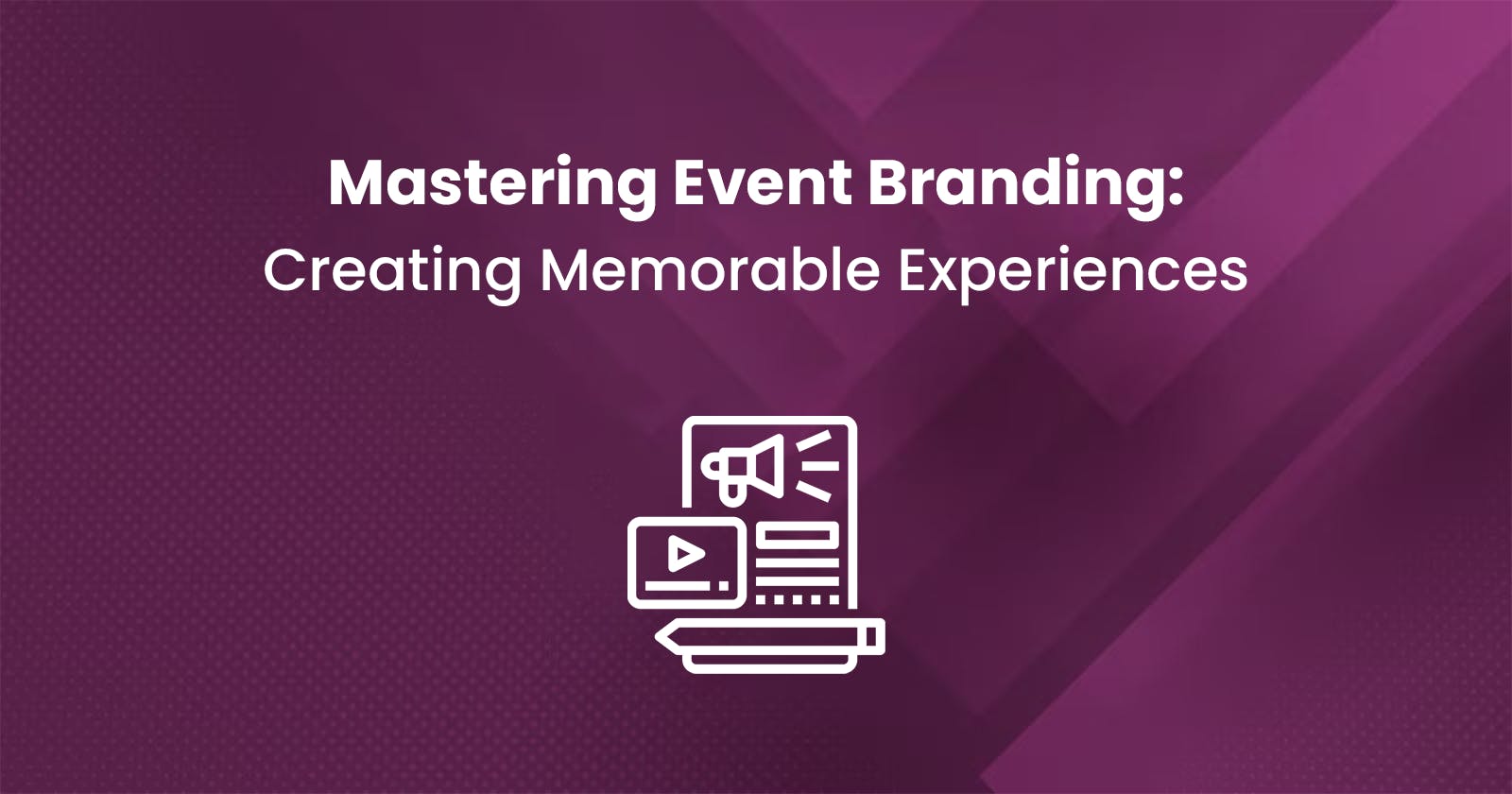Event branding plays a pivotal role in creating memorable and impactful experiences that resonate with attendees long after the event concludes.
Whether it's a corporate conference, music festival, or charity fundraiser, effective event branding sets the stage for success by shaping perceptions, fostering connections, and leaving a lasting impression.
At its core, event branding involves crafting a cohesive identity that aligns with the event's purpose, values, and target audience. It encompasses a broad range of elements, including visual design, messaging, tone, and overall experience.
A well-executed event brand not only captures attention but also evokes emotions, builds anticipation, and communicates key messages.
In today's dynamic landscape, where competition for attention is fierce, event branding has become a strategic necessity. It helps organizers differentiate their events, cultivate a loyal following, and drive attendance.
By leveraging branding principles, event professionals can effectively communicate their event's unique value proposition, foster a sense of community, and create a buzz that extends beyond the event itself.
In this article, we’ll take you through what event branding is all about, including its benefits, core elements, ideas, and tips to ensure a successful event branding strategy.
Let’s get right in!
What is event branding?
Event branding refers to the strategic process of creating a distinct and cohesive identity for an event, encompassing its visual aesthetics, messaging, values, and overall experience.
It involves crafting a narrative that resonates with the target audience, communicates the event's purpose, and sets it apart from competitors.
Event branding extends beyond mere logos and color schemes; it is about creating a holistic and immersive experience that engages attendees on multiple levels.
For conferences and professional events, branding plays a crucial role in establishing credibility, attracting attendees, and driving engagement. branding elements into their events is crucial for success.
Why you need to think about event branding
Event branding is not just a superficial exercise; it is a strategic approach that can yield numerous benefits for event organizers.
Whether you are planning a conference, trade show, or any other type of event, investing time and effort into event branding can make a significant difference in its success.
Let's explore the key reasons why you need to prioritize event branding.
Communicates event vision
Improved brand awareness and recognition
Attracts sponsors, vendors, and prospects
Builds trust and brand loyalty
Creates a compelling experience.
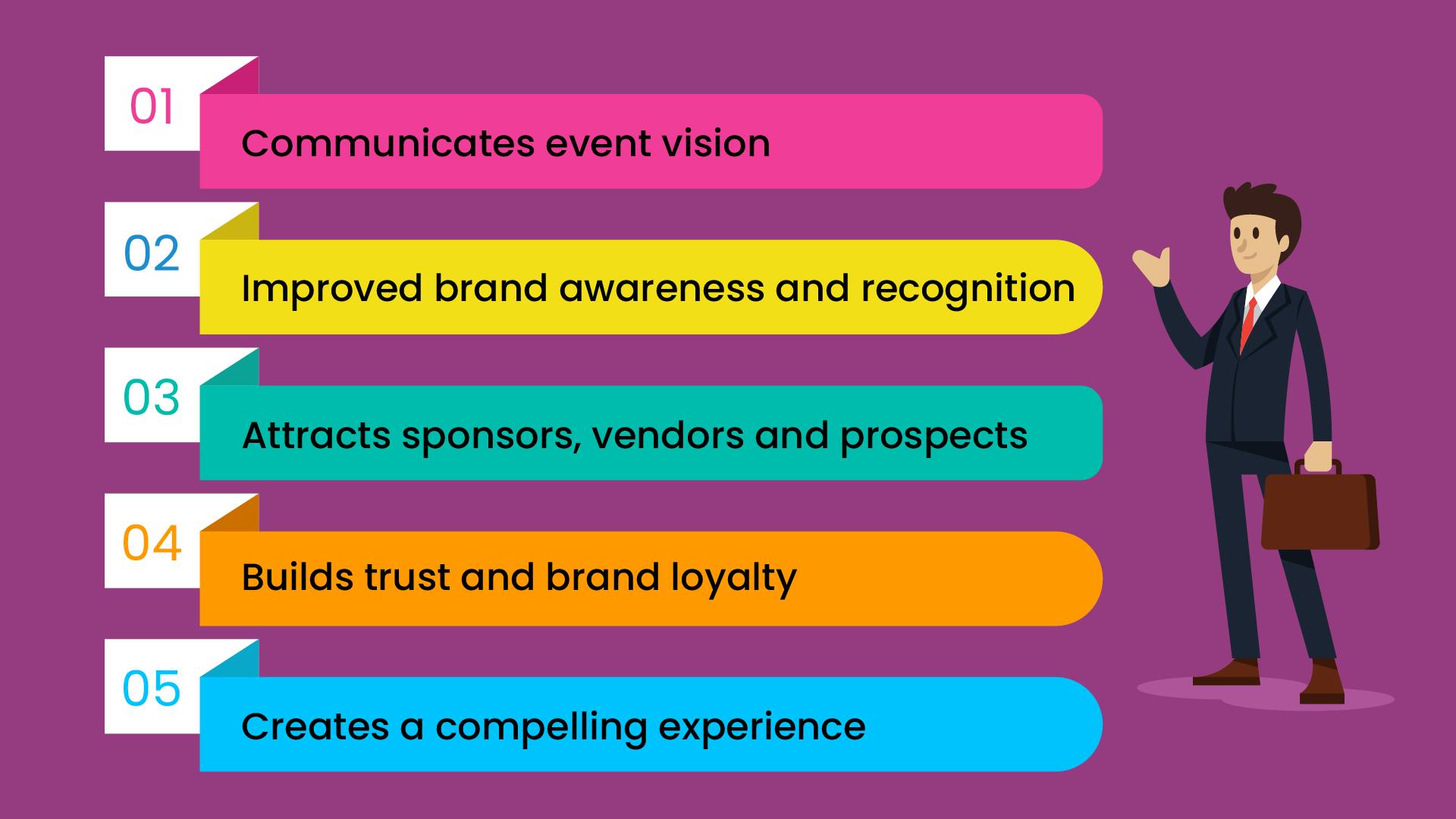
1. Communicates event vision
Event branding serves as a visual and narrative representation of the event's vision and purpose. It provides a framework for conveying the event's objectives, theme, and core messages to both attendees and stakeholders.
A well-defined event brand ensures that everyone understands the event's unique value proposition and aligns with its overall vision.
2. Improved brand awareness and recognition
Strong event branding creates a distinct and memorable identity that differentiates your event from competitors. Through consistent use of logos, colors, and messaging, event branding boosts brand recognition, even beyond the event itself.
Attendees, sponsors, and vendors will easily associate your event with its unique brand, enhancing its visibility and establishing a strong presence in the industry.
3. Attracts sponsors, vendors, and prospects
A well-executed event brand not only captures the attention of attendees but also attracts potential sponsors, vendors, and prospects.
Sponsors and vendors are more likely to partner with events that have a strong brand identity as it reflects professionalism and credibility.
A compelling event brand can act as a powerful magnet, enticing key stakeholders to participate and support your event.
4. Builds trust and brand loyalty
Consistent and authentic event branding builds trust among attendees and stakeholders. When your event brand conveys professionalism, reliability, and a commitment to quality, it fosters confidence in the overall event experience.
Attendees who connect with your event brand are more likely to become loyal advocates, returning year after year and recommending the event to others.
5. Creates a compelling experience
Event branding goes beyond visual aesthetics; it encompasses the entire attendee experience. A well-crafted event brand sets the tone, creates anticipation, and guides the design and execution of the event.
From the moment attendees encounter the event's branding materials to the actual event experience, a cohesive and compelling brand identity enhances engagement, leaving a lasting impression.
The core elements of event branding
When it comes to event branding, there are two main categories of elements: digital elements and on-site elements. Let's explore each category and discuss why these elements are essential.
Digital elements
Digital elements encompass all the online and virtual components of event branding. These elements play a significant role in attracting and engaging the audience before, during, and after the event. Here are some key digital elements.
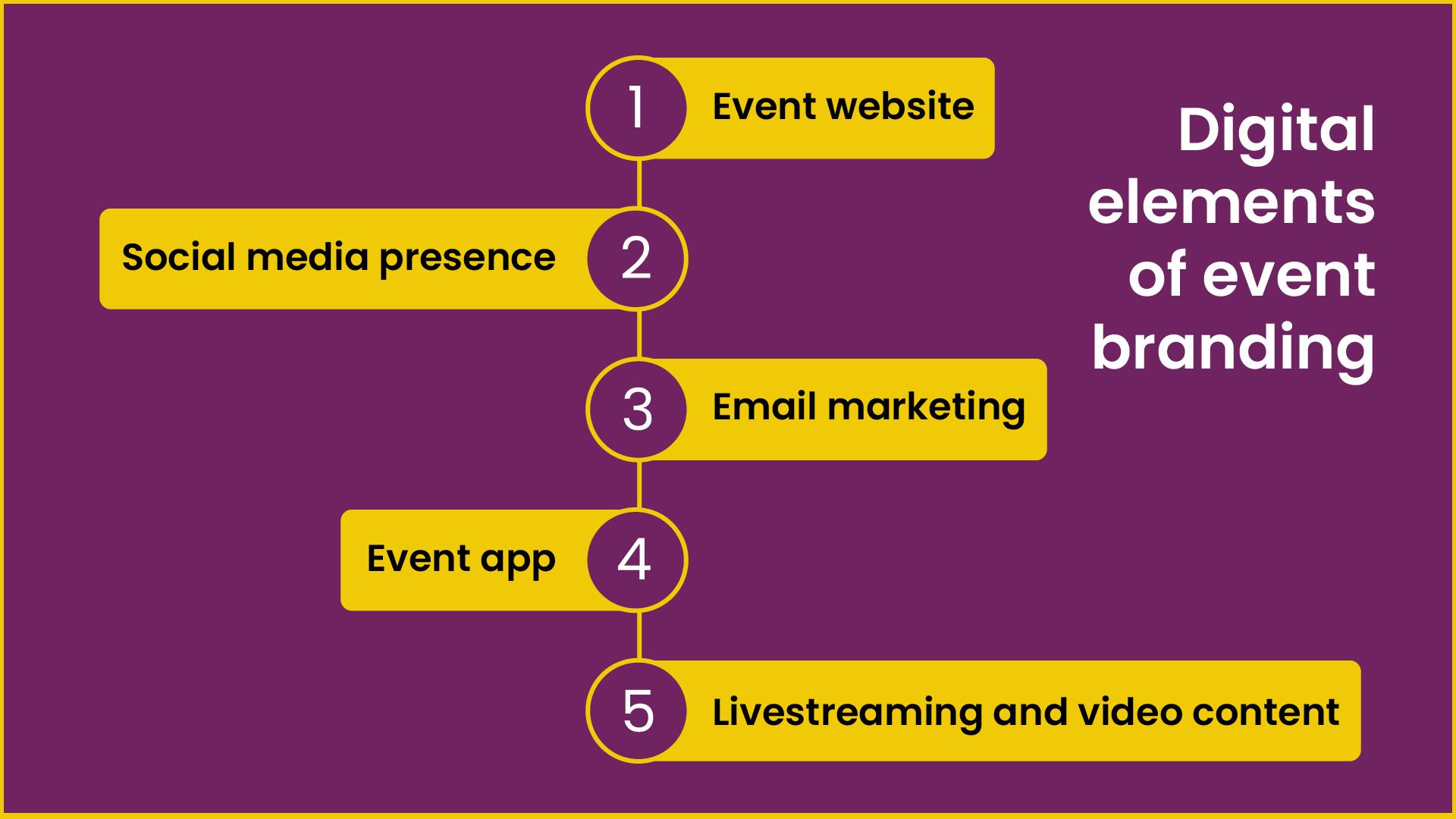
- Event website:
The MOST important element is your event website which serves as the central hub of information about the event. It provides details about the agenda, speakers, sponsors, and registration process. A well-designed and user-friendly website helps build credibility and generates excitement among potential attendees.
- Social media presence:
Establishing a strong presence on social media platforms such as Facebook, Twitter, LinkedIn, and Instagram allows event organizers to engage with their audience in real-time.
It provides an opportunity to share updates, create buzz, and encourage participation through contests, polls, and interactive content.
- Email marketing:
Email campaigns are effective tools for reaching out to a targeted audience, providing updates, and building anticipation for the event. Personalized and well-crafted emails can drive registrations, promote speakers, and highlight key features of the event.
- Event app:
An event app enhances the attendee experience by providing essential information, schedules, session details, and networking opportunities. It allows participants to customize their agenda, connect with other attendees, and receive real-time updates during the event.
- Live streaming and video content:
Livestreaming the event sessions and creating engaging video content not only allows remote participants to be part of the event but also extends the event's reach beyond the physical location. It enables organizers to showcase highlights, share speaker interviews, and create post-event content for promotion and future engagement.
On-site elements
On-site elements are the physical and tangible aspects of event branding that shape the attendee's experience during the event. These elements contribute to creating a cohesive and immersive environment.
Here are some key on-site elements:
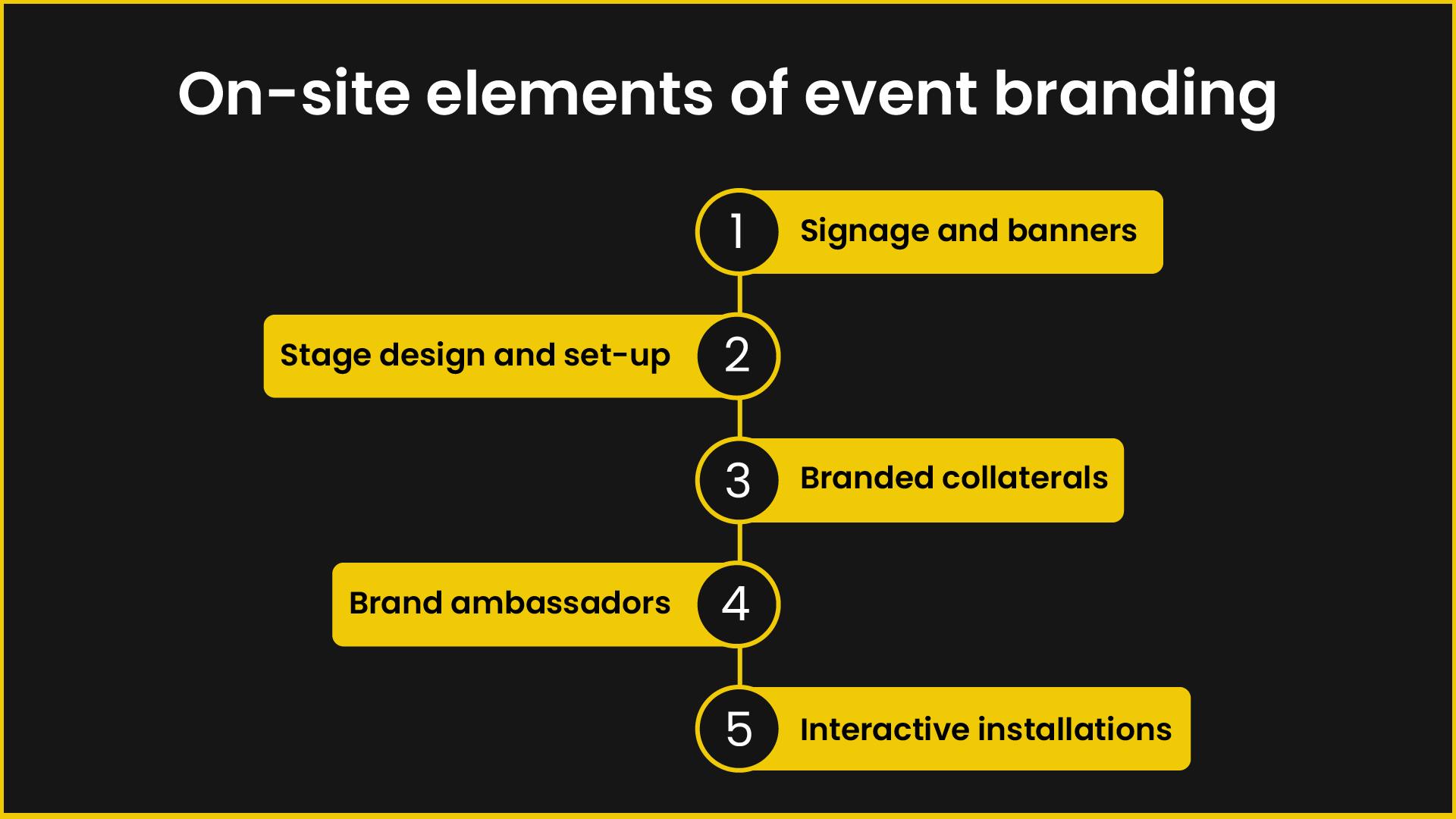
- Signage and banners:
Clear and visually appealing signage and banners help guide attendees, create a professional atmosphere, and reinforce the event's branding. They can display the event logo, sponsors' logos, and key messages, ensuring consistent branding throughout the venue.
- Stage design and set-up:
The design of the stage and overall event set-up can create a visually captivating and immersive experience for attendees. A well-designed stage backdrop with branding elements, lighting effects, and multimedia displays can enhance the event's impact and make it memorable.
- Branded collaterals:
Providing branded collaterals such as name tags, lanyards, tote bags, notepads, and pens can reinforce the event branding and serve as keepsakes for attendees. These items often continue to promote the event even after it concludes.
- Brand ambassadors:
Having brand ambassadors or event staff dressed in branded attire can help create a cohesive and professional look. They can provide assistance, answer questions, and reinforce the event's branding and messaging.
- Interactive installations:
Depending on the event you’re organizing, engaging attendees with interactive installations or photo booths that incorporate event branding elements can create memorable experiences. These installations can encourage social sharing and help extend the reach of the event through user-generated content.
* * *
The importance of these elements lies in their ability to create a cohesive and immersive experience that aligns with the event's objectives.
What you need to remember is consistency. Consistency in branding across all touchpoints ensures that attendees have a unified and memorable experience throughout their interaction with the event.
Tips and best practices to nail your event branding
Let’s look at a few simple yet highly effective ideas that you can implement to elevate your branding efforts and maximize the impact of your events.
Maintain visual consistency Know your audience Craft a compelling story Maintain consistent messaging Engage attendees Create customized and branded landing pages Utilize social media Collaborate with influencers Indulge in post-event feedback and evaluation
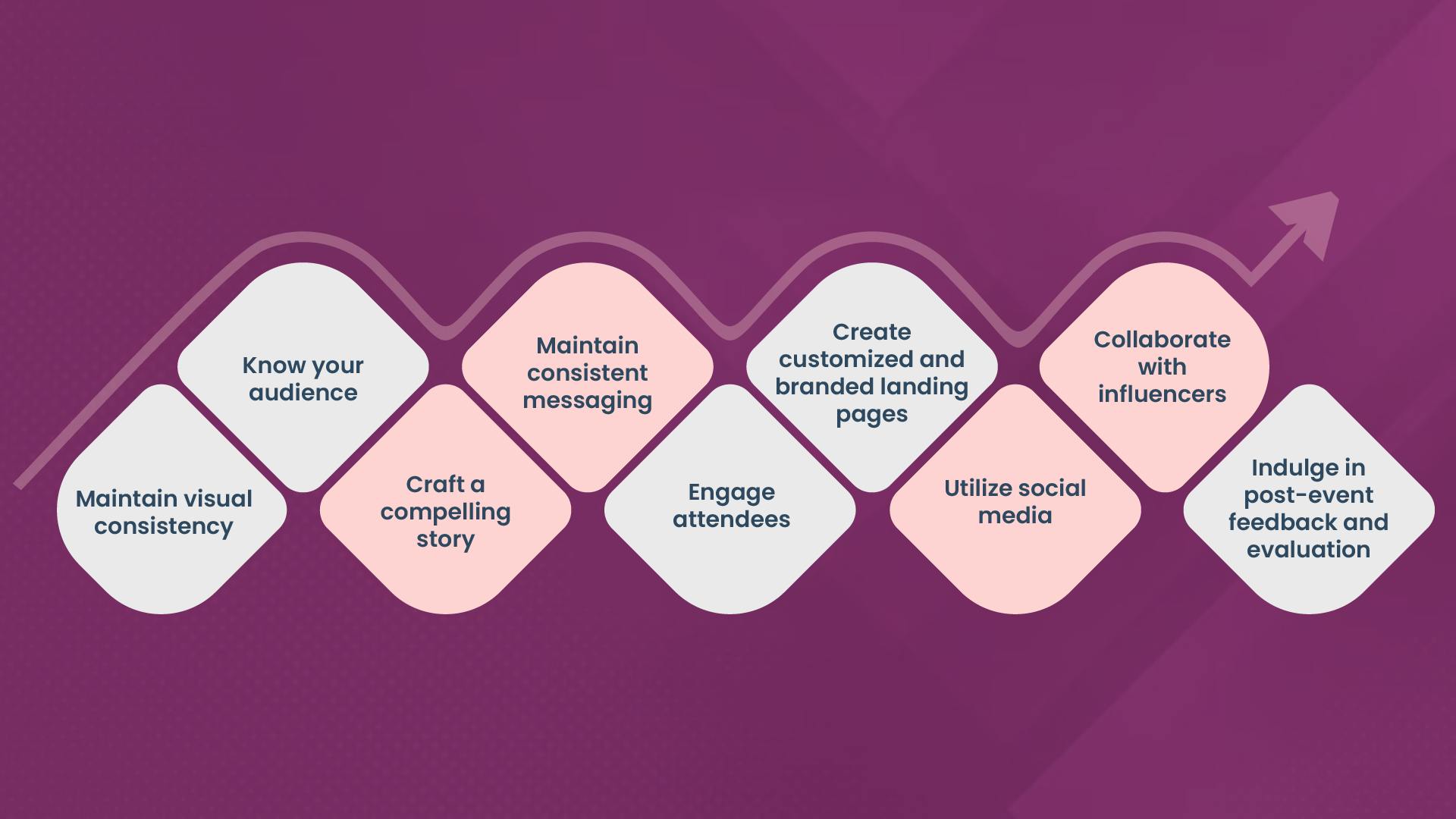
1. Maintain visual consistency
Consistency in visual elements is vital for event branding. Establish a cohesive visual identity by using consistent colors, typography, and design elements across all event materials, including websites, promotional materials, signage, and social media graphics.
This consistency helps create brand recognition and reinforces the event's professionalism.
2. Know your audience
Understand your target audience and their preferences to create a brand that resonates with them. Conduct market research, analyze attendee demographics, and gather feedback to gain insights into their interests, values, and motivations.
Tailor your branding elements to align with their expectations and preferences, ensuring your event brand connects on a deeper level.
3. Craft a compelling story
Develop a captivating narrative that communicates the essence of your event. Identify the unique value proposition and core messages you want to convey.
Weave these into your branding elements, including taglines, slogans, and social media captions. Tell a story that engages attendees, evokes emotions, and inspires them to be part of your event.
4. Maintain consistent messaging
Ensure consistent messaging throughout your event. All communication channels, including emails, social media posts, press releases, and onsite signage, should align with your event brand.
Consistency in tone, voice, and messaging strengthens your brand identity and reinforces your event's key messages.
5. Engage attendees
Create opportunities for attendees to actively engage with your event brand. Encourage them to share their experiences on social media using event-specific hashtags.
Consider incorporating interactive elements, such as photo booths or experiential activations, that align with your brand and encourage attendees to become brand ambassadors.
You could even host other interactive sessions such as live quizzes or event tournaments with leaderboards that help incentivize your attendees to participate actively and significantly enhance the event experience for them.
6. Create customized and branded landing pages
Create branded landing pages to centralize event information, registration, and engagement. These personalized online hubs align with your event's visual identity and provide a seamless user experience.
Customized landing pages showcase event highlights, speakers, agenda, and sponsorship opportunities, serving as a dedicated space for attendees to connect, interact, and access essential resources.
Enhance the event experience and reinforce your brand by utilizing these tailored online platforms.
7. Utilize social media
When it comes to event branding, social media is one of your best friends. Establish a strong presence on relevant platforms and engage with your target audience. Share captivating content, event updates, and highlights.
Encourage attendees to use event-specific hashtags, fostering a sense of community. Promptly respond to comments, and collaborate with influencers to expand your reach.
By leveraging social media, you can extend your event's visibility, foster engagement, and create a dynamic online presence that reinforces your brand.
8. Collaborate with influencers
Partner with influencers or industry experts who align with your event brand. Their endorsement can amplify your brand reach and credibility. Collaborate on content creation, social media promotions, or even speaking engagements to leverage their influence and reach a wider audience.
9. Indulge in post-event feedback and evaluation
Gather feedback from attendees and stakeholders after the event to assess the effectiveness of your event branding. Conduct surveys, interviews, or online polls to gather insights into their perception of the brand and the overall event experience.
Use this feedback to make improvements and refine your branding strategy for future events.
To wrap up,
Event branding is a crucial element for the success of any event. By creating a cohesive and memorable brand identity, you can effectively communicate your event's vision, attract attendees and sponsors, and foster trust and loyalty among your audience.
To further simplify and streamline the process, event management software/platforms can be invaluable. And if you don’t know where to start looking, try KonfHub!
KonfHub offers comprehensive solutions for organizing, promoting, and managing events, providing customizable registration pages, branded event websites, and integrated communication channels.
In addition to its comprehensive event management solutions, KonfHub provides a host of powerful features that enhance event branding and leave a lasting impact on attendees:
Customizable event pages: With KonfHub's platform, you have the creative freedom to customize event pages.
Logo on tickets: KonfHub understands the significance of even the smallest branding details. You can now add your logo to event tickets as well, reinforcing brand recognition throughout the event journey. Each ticket issued carries the essence of your brand, leaving a lasting impression on attendees.
Customizable event registration emails: KonfHub streamlines communication with pre-made email templates for event registration. You can easily save time while maintaining a consistent brand image. You can also customize the email content to suit your specific needs, enabling seamless email campaigns that effectively engage attendees.
Branded feedback forms and certificates: From KonfHub, you can create a feedback page that is customizable to your brand requirements (colors, logos, posters, etc). You can also issue a fully custom participation certificate (no watermark on the certificates!). Issuing the certificates is also completely automated - on submission of feedback, you can issue the participation certificate!
With every interaction and touchpoint meticulously branded, attendees are immersed in a unified visual language that fosters trust, loyalty, and a sense of professionalism.
KonfHub's dedication to simplifying event branding enables organizers to focus on what truly matters – delivering an exceptional event that leaves a lasting impression on all participants.
Schedule a demo today to see how KonfHub makes event branding and organizing a walk in the park!

